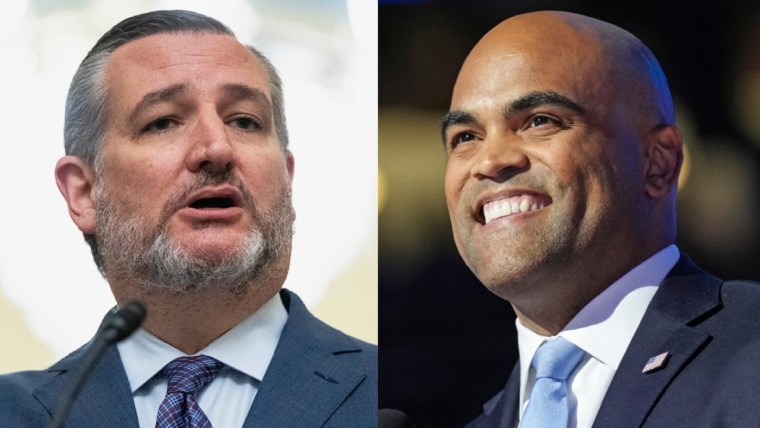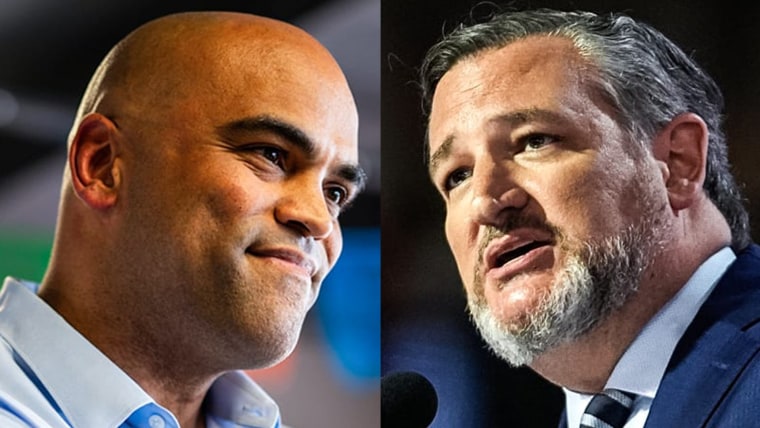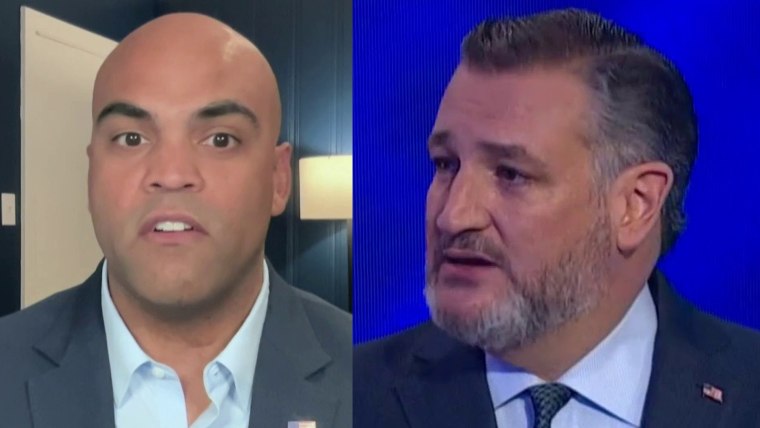There’s a reason no Democrat has accomplished a statewide victory in Texas since 1994.
Pulling off such an upset would require a uniquely talented politician running an almost perfect campaign. That candidate would need to display discipline, calm and poise. Be telegenic and quick on the feet. The candidate would need to be thoroughly Texan and have an identity infused with elements of the state’s cultural zeitgeist. The person would need to run in a halfway decent national political environment. And even with all of those boxes checked, that rare Democrat would still need to square off against an extraordinarily disliked Republican running a lackluster campaign without much support from the person's own colleagues.
Enter: Rep. Colin Allred.
An impressive debate performance alone is not enough for a Democrat to win a state like Texas.
Allred’s remarkable debate performance Tuesday spawned a flurry of Instagram slides, TikTok videos and X posts. Both in Texas and nationwide, news feeds have been flush this week with clips of the former professional football player rebuking Sen. Ted Cruz for hiding in a “supply closet” during the attempted insurrection at the U.S. Capitol — a riot by a mob that Cruz himself helped whip up. Others showed him repeatedly referencing the time Cruz flew to Cancun, Mexico, as hundreds of Texans died during the middle of a winter freeze, or hammering him on his abortion stance — an issue critical to white female voters who have been abandoning the GOP in droves.
But an impressive debate performance alone is not enough for a Democrat to win a state like Texas. However, polls, fundraising and a changing political climate have all looked promising for Allred. Today, Texas Democrats are in an extraordinary situation, one that has proved elusive over the past three decades: They have an actual chance of winning a statewide race.
As of Thursday, FiveThirtyEight’s average of polls had Cruz stuck at 48.4%. A Morning Consult survey released Thursday showed Allred down by just 1 point. An internal memo from the Senate Leadership Fund — the Mitch McConnell-aligned super PAC focused on electing Republicans to the Senate — had Cruz up by only 1 point. A different polling memo released by the National Republican Senatorial Committee omitted any information on the race. If the numbers were too bad to share, that’s certainly a worrying sign for Cruz.
Democrats have been hopeful about statewide races before, but this time is different. In 2022, some polls had Beto O’Rourke narrowly trailing Gov. Greg Abbott. But by the start of October, Abbott was consistently polling above 50% and, in the end, he beat O’Rourke by 9 points. Sen. John Cornyn, for much of his 2020 re-election bid, was running neck and neck with one-time rising star MJ Hegar (whose campaign one of us worked on). But, by the time voting began, Cornyn pulled away and was polling above 50% with some consistency. Cornyn achieved a comfortable 10-point victory.

The last time Texans had a race this close, this late in the election, was Cruz’s re-election bid in 2018, in which he narrowly beat O’Rourke by less than 3 points. But that year, the senator’s polling looked rosier then than it does today. In the world of campaign politics, any incumbent stuck under 50% in the polls when votes are days away is leaving the door open to a loss.
Just ask former Georgia Sens. David Perdue and Kelly Loeffler. In their 2020 elections, just like Cruz now, incumbent Republicans in a historically red state failed to clear 50% in public polling. Both lost to exciting, young, dynamic Democratic challengers, costing the GOP the Senate.
Recent appearances suggest Cruz is feeling that heat. On Fox News host Sean Hannity’s show Monday, Cruz begged for donations and plugged his campaign website a half-dozen times. On a different Fox appearance, Cruz lashed out at his own party — attacking Minority Leader Mitch McConnell by name for not spending on his race and accusing him of only spending his $400 million on the senators “who obey him.”
A winning Democratic coalition in Texas is extremely diverse and fragile.
Why has this race been different? It’s true that Cruz is flailing. But while the senator has refused to clarify his own positions and been ruthlessly mocked in the press, Allred has put together an exceedingly impressive campaign. He has painted himself to be everything Cruz is not, contrasting Cruz’s Jan. 6 behavior with his own willingness to defend the House floor when the mob came rushing in. He painted quite a picture of himself that day: taking his jacket off, sending loving texts to his wife and getting ready to physically fight the threat to democracy.
Allred is also a former NFL linebacker with a bright, white smile. He helped a Texas family free their Marine son from Russian captivity when Cruz did not, and the Marine’s father, Joey Reed, has created searing campaign ads for the explicit purpose of removing Cruz from office. Allred’s bravery may not be enough on its own — but it sings when compared to Cruz’s cowardice.
Allred is also running in a fundamentally different political environment than O’Rourke, Hegar and other promising Texas Democrats were. Progressive groups and Allred’s campaign have invested tens of millions of dollars in Democratic political infrastructure in Texas. This massive infusion of resources has helped raise the starting point for Allred — and the shorter you have to climb, the less likely you are to fall.
As of Sept. 30, Allred had raised a total of $67 million during his run, blowing past Hegar’s $29 million total from 2020 and rivaling O’Rourke’s record-breaking $79 million from 2018. Cruz, admittedly, has outraised Allred, amassing almost $75 million as of Sept. 30. But Allred’s fundraising has only increased as the election has neared. In the third quarter, Allred brought in a staggering $30 million, outpacing Cruz’s $21 million haul and allowing Allred to outspend the incumbent in the all-important home stretch of the race.

Allred has put that money to good use, flooding the airwaves with ads emphasizing tried and true, broadly appealing populist campaign themes such as securing the border, defending abortion access, protecting Medicare and Social Security, and highlighting his NFL past.
Cruz’s advertising, by contrast, has dived headfirst into the culture wars. His ads mirror those of former President Donald Trump’s campaign, harping on trans kids participating in youth sports. One such ad from a Cruz-supporting PAC depicts a large black man in an “Allred” jersey viciously tackling a girl attempting a catch in flag football. Obviously, the implication that NFL linebackers are playing girls’ flag football is false (as is the suggestion you can clothesline a receiver in flag football). It’s possible, though perhaps optimistic, that ads employing scare tactics against nonexistent threats have begun to ring hollow for voters.
But this is Texas. Even though Allred is performing better than any statewide Democratic candidate in recent history, he’s not the favorite on Election Day. Kamala Harris’ presidential campaign is unlikely to spend substantial resources on turning out Texas voters. Cruz, on the other hand, will assuredly reap downstream benefits from Trump’s efforts in Texas.
Additionally, a winning Democratic coalition in Texas is extremely diverse and fragile. To get to 50% + 1, Allred will need to run up the score in urban centers, especially among voters of color. He’ll also need to persuade swing-y South Texas Hispanic voters and he’ll need to do that while maintaining the favor of white, college-educated suburban voters.
It’s a huge mountain to climb — and one that hasn’t been summited in 30 years. But if Allred doesn’t emerge victorious, he’s still carried Democrats further than any other candidate in recent memory.

